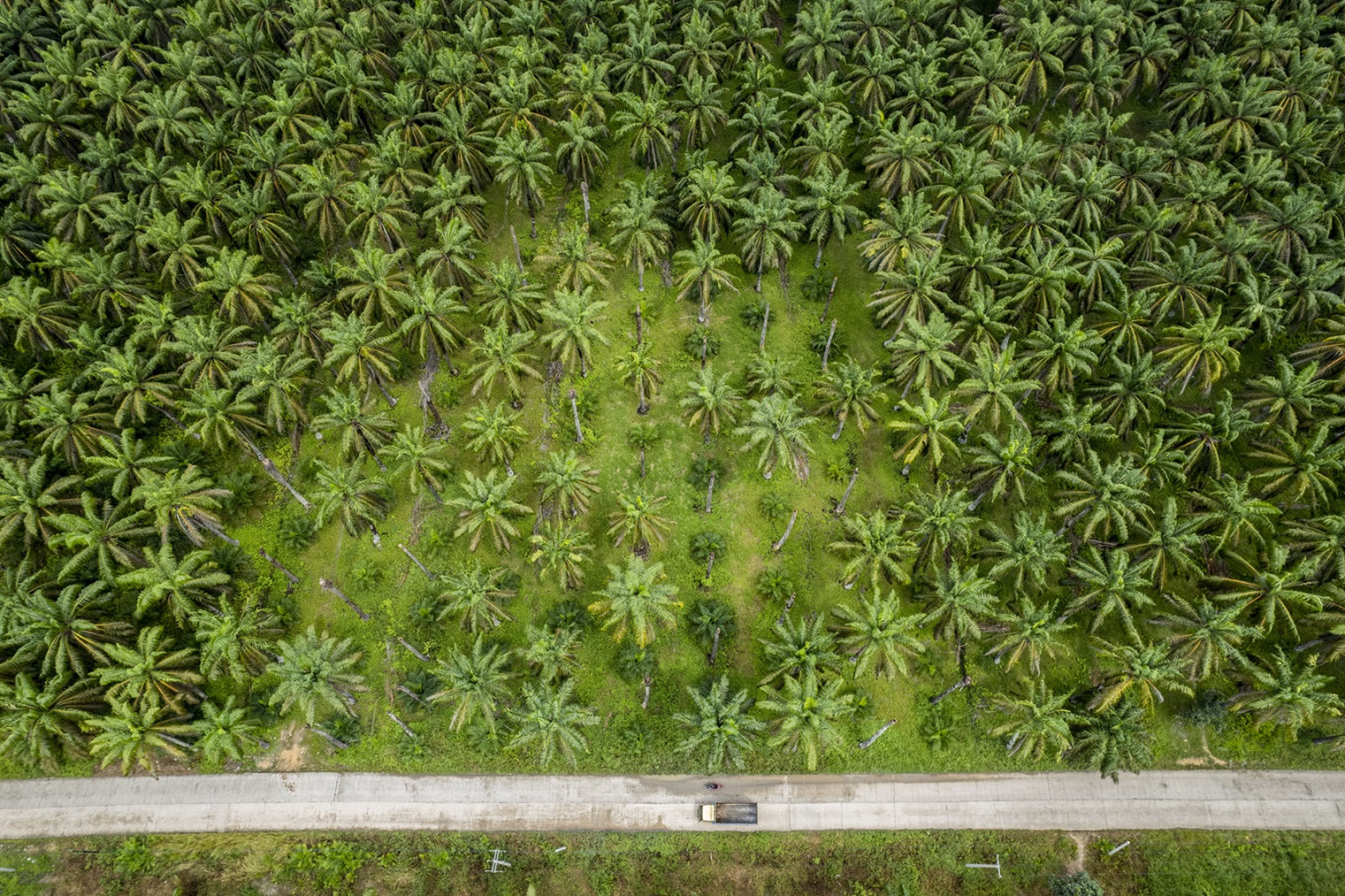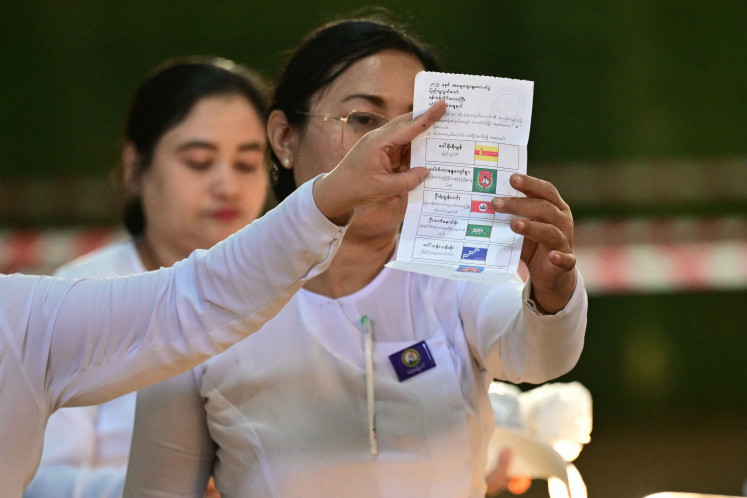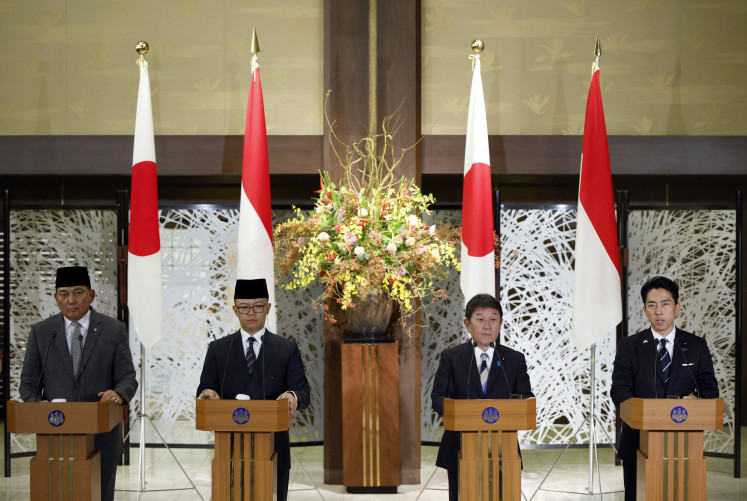Popular Reads
Top Results
Can't find what you're looking for?
View all search resultsPopular Reads
Top Results
Can't find what you're looking for?
View all search resultsStrengthening legal certainty in the palm oil industry
Expectation is now high that Agrinas will serve as a breakthrough and solution to address legal uncertainties, particularly on overlapped land status which has been haunting many palm oil companies.
Change text size
Gift Premium Articles
to Anyone
T
he Forest Area Control Taskforce, set up under Presidential Regulation No.5/2025 specially to bring order to the palm oil industry, has confiscated an estimated 1.2 million hectares (ha) of oil palm plantations allegedly developed by almost 370 companies in forest areas in nine provinces in Sumatra, Kalimantan and Sulawesi.
But instead of reforesting the seized oil palm estates, the plantations were put under the management of PT Agrinas Palma Nusantara, a state-owned enterprise set up in February specially to own and operate the plantations.
It was a great wonder though that the bold law enforcement measure did not cause any uproar among the business community. Not a single lawsuit was filed to counter the government measure. Even the Indonesia Palm Oil Association (Gapki), which groups palm oil companies throughout the country, kept silent.
But it is also mindboggling to observe that Agrinas or Danantara, the superholding of all SOEs, did not give further explanations as to whether Agrinas has fully taken over both the legal ownership and the operational management of the seized plantations.
This lack of transparency is not good for restoring legal certainty to the palm oil industry. We don’t think the transfer of the management had run so smoothly and peacefully because Agrinas, which is only less than six months old, did not have any experience in managing plantations. Moreover, there were issues about the debts of the former corporate owners of the plantations.
Plantation management is rather complex because it is quite labor-intensive and requires a large number of farm extension workers to guide and train workers. Its operations must also conform with many laws and regulations, while adhering to applicable industry standards.
The government needs to explain how the status of the confiscated plantations has been made clean and legally clear because this process can be used as a model for addressing the legal uncertainty the millions of smallholder plantations are now facing due to the unclear title of their land.
Without official explanations, Agrinas, which will soon become the largest owner of oil palm plantations in the country, even larger than the Wilmar, Sinar Mas and Musim Mas groups, could be seen simply as a rent seeker who serves only as a de jure owner of the plantations, while the assets are still fully under the management of their former owners.
As the world’s largest palm oil producer with an annual output of over 50 million tonnes, this commodity plays a very important role in the country’s economy, accounting for around 55 percent of global exports in 2024 and about 4.5 percent of the gross domestic product (GDP) and employing directly and indirectly over 16 million people, according to Statistics Indonesia (BPS).
High prices and growing demand underscore Indonesia's palm oil sector's economic importance, but they also require the urgency of addressing environmental challenges. Palm oil governance will drive improvements in the management of other commodities as well.
BMI Industry Research’s latest report estimated global palm oil production to reach 80.6 million tonnes in the 2025/26 season, representing a 2.4 percent year-on-year (yoy) increase, facilitated by an expected 0.5 percent yoy in Malaysia, the world’s second largest producer and a 3.3 percent increase in Indonesia. BMI expected global palm oil consumption in the 2025/26 season to reach 78.3 million tonnes, representing a yoy increase of one percent.
Expectation is now high that Agrinas will serve as a breakthrough and solution to address legal uncertainties, particularly on overlapped land status which has been haunting many palm oil companies.
The government's strong policies to improve palm oil governance and reduce deforestation have led most palm oil producers to adopt a stringent sustainability standard and a no deforestation commitment.
We are glad to know the world has now admitted that the palm oil sector in Indonesia is one of a few success stories, demonstrating how economic growth and environmental protection can go hand in hand, adhering to global green standards.
Certainly improving productivity and yield is the most effective way, but again, the biggest challenge in this aspect is the need to empower the million shareholders who own almost 40 percent of the estimated 16.5 million ha of oil palm estates across the country. Currently, smallholder productivity averages approximately half as high as that of companies.
The biggest challenge now is how to steadily increase palm oil production to meet the steady increase in the global consumption of this edible oil while adhering to the global green standards and our commitments to achieve zero carbon emission.
Therefore, in order to ensure that our palm oil production fully meets international sustainable standards the government needs to address the misalignment in the understanding about what is legally and environmentally defined as no-deforestation.
In this context, the Agrinas takeover of the confiscated plantations should become the opportunity to amend the existing national forest land use and spatial planning to address persistent allegations against palm oil as the main cause of deforestation. Efforts to achieve fully sustainable palm oil production have always been hindered by the issues of overlapping land-title administration with forest areas.
Agrinas’ success in managing the palm oil plantations sustainably will be a milestone for the leadership of the Prabowo Subianto administration in resolving the very complex and protracted land use issues and legal uncertainty, thereby protecting the palm oil industry as a strategic industry.
---
The writer is a sustainable palm oil analyst. The views expressed are personal.











